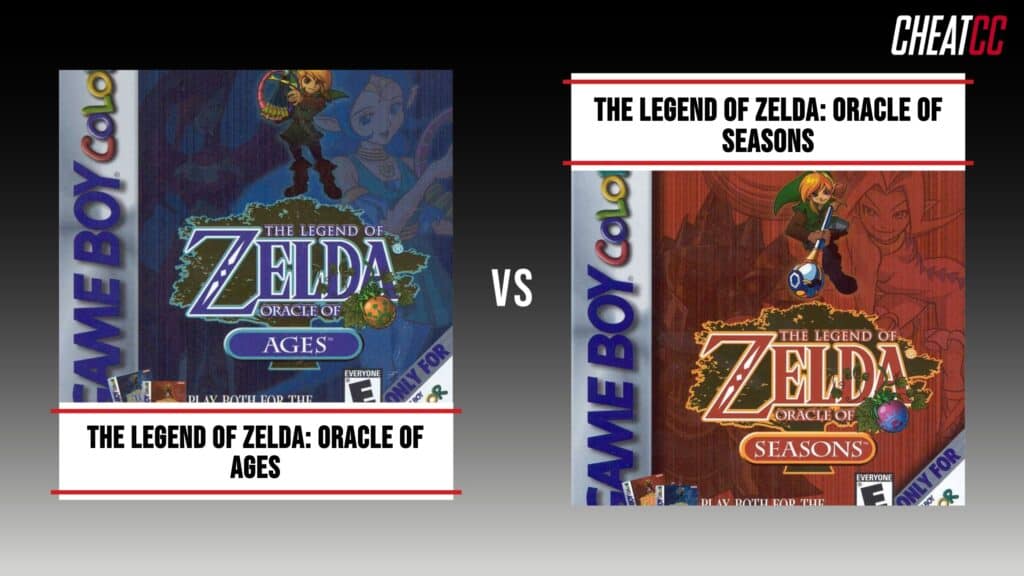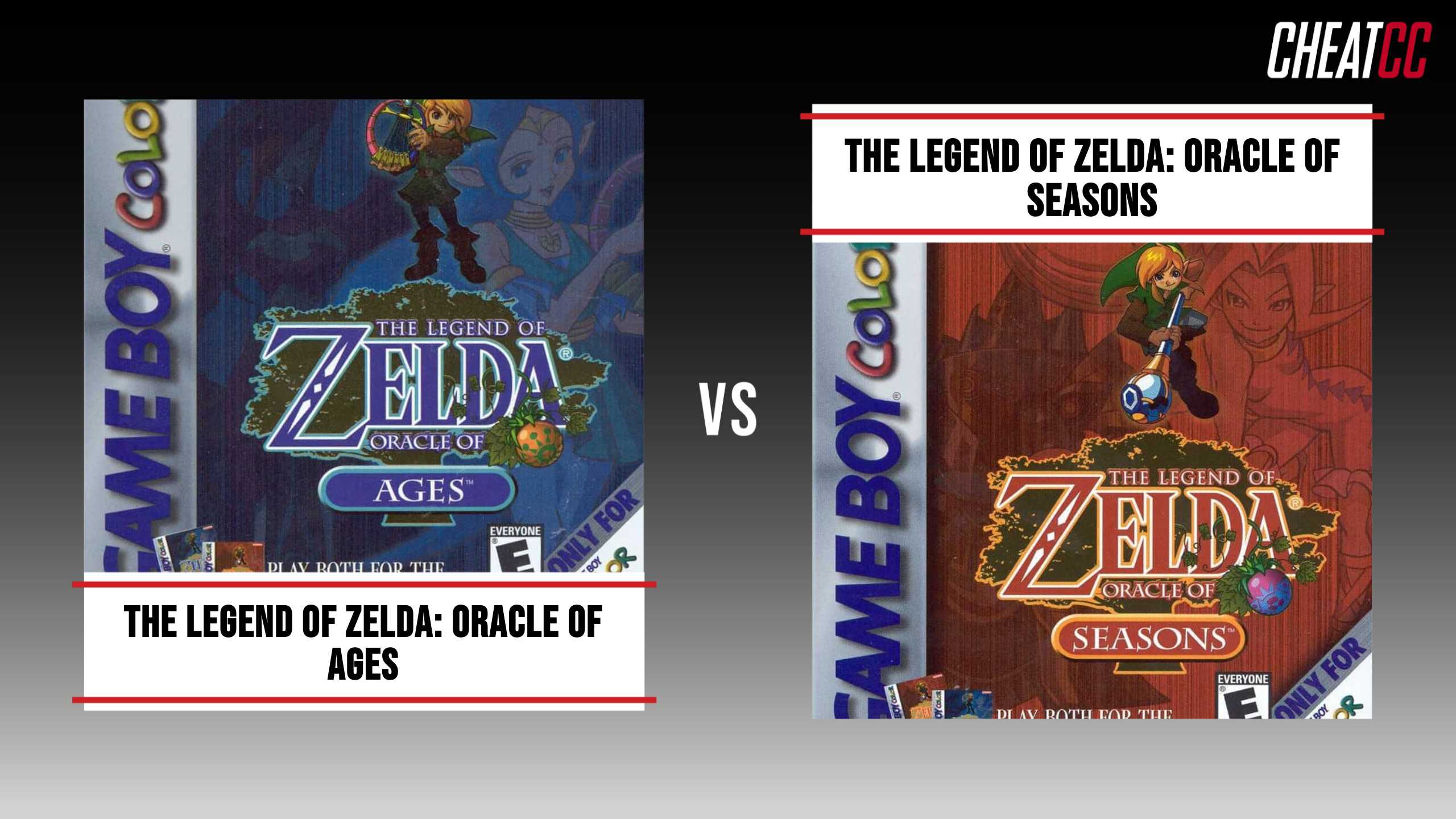The Legend of Zelda: Oracle of Ages and Oracle of Seasons remain two of the most-beloved handheld titles in the Zelda series’ history. Releasing in 2001 right at the height of the Pokemon craze, each game exists as two halves of a whole story, with players being able to play one game and carry a save file into another just like in the original Kanto region Pokemon titles. However, most players’ ability to only get one of these two games initially raised the dilemma of Zelda: Oracle of Ages vs Zelda: Oracle of Seasons to see which would earn its place in fans’ game libraries.
Perhaps most interesting about the Oracle games is that they come from developer Flagship, a studio made up of veteran Nintendo, Capcom, and Sega talent founded in a joint partnership between Nintendo and Capcom. In addition to both Oracle games, Flagship would also go on to develop The Minish Cap for Game Boy Advance, which also stands as one of the cult-classic titles in The Legend of Zelda series for its excellent combat and dungeon design. Though players with a Nintendo Switch Online subscription can now easily play both Oracle games, they are different enough to warrant a closer a look at which reigns supreme as the best Game Boy Color Zelda.
Zelda: Oracle of Ages vs Zelda: Oracle of Seasons: Side-by-Side Comparison

Aside from both games coming from the same developer and releasing in the same year for the Game Boy Color, the Oracle games in the Zelda series are actually quite different from one another. As their names imply, each of the Oracle games features a defining mechanic that factors in heavily to its world, dungeon, and puzzle design, with Oracle of Ages seeing Link manipulate time and Oracle of Seasons having the Hero of Time take control of the weather. Further, both games take place in their own unique regions outside of Hyrule, though they do feature their fare share of familiar faces making cameos.
| Characteristic | Zelda: Oracle of Ages | Zelda: Oracle of Seasons |
|---|---|---|
| Release Date | February 27, 2001 (JP) May 14, 2001 (NA) | February 27, 2001 (JP) May 14, 2001 (NA) |
| Platform | Game Boy Color | Game Boy Color |
| Developer | Nintendo, Flagship | Nintendo, Flagship |
| Setting | Labrynna | Holodrum |
| Primary Mechanic | Time manipulation using the Harp of Ages | Weather manipulation using the Rod of Seasons |
| Number of Dungeons | 8 | 9 |
| Gameplay Focus | Puzzles | Combat |
| Total Sales | 3.96 million units | 3.99 million units |
| Review Aggregate Score | 92% | 91% |
| Available on Nintendo Switch Online | ✅ | ✅ |
Zelda: Oracle of Ages vs Zelda: Oracle of Seasons: 5 Must-Know Facts
Here are 5 must-know facts comparing Zelda: Oracle of Ages and Zelda: Oracle of Seasons:
- While Oracle of Ages and Oracle of Seasons both follow in the footsteps of Link’s Awakening (including using several of the same graphical assets and music), they each feature a different gameplay focus and primary mechanic. Ages focuses on using time manipulation to solve intricate puzzles whereas Seasons is all about weather manipulation and combat.
- As a result of its greater focus on combat, Oracle of Seasons features 9 dungeons for Link to explore versus Oracle of Ages‘ 8. Both games also feature different secondary items and equipment that Link needs to use to reach inaccessible areas, each aligning with the games’ different emphases on puzzle-solving and combat.
- Link’s Awakening serves as the template for handheld Zelda games, itself following in the footsteps of the SNES classic A Link to the Past. Several of the team members working on Link’s Awakening would go on to also work on both of the Oracle games.
- Both Oracle of Ages and Oracle of Seasons are incredibly successful games, selling just under 4 million copies each and standing as the best-selling Game Boy Color games in Japan during the month of their release. Despite their comparable sales, Oracle of Ages has a slightly higher critical reception.
- Thanks to the Nintendo Switch’s Nintendo Switch Online service and its classic game collections, players can now experience both of the Oracle games back-to-back as part of the service’s basic subscription tier, as well as having access to the Game Boy Color remake of Link’s Awakening, Link’s Awakening DX.
Zelda: Oracle of Ages vs Zelda: Oracle of Seasons: Different Mechanics
The primary differentiating factor between Oracle of Ages and Oracle of Seasons are the mechanics that each utilizes, each of which feature in the games’ naming. Oracle of Ages sees players use the Harp of Ages to rewind time in certain locations and in dungeons, with a focus on puzzle-solving and environmental awareness. Conversely, Oracle of Seasons sees Link utilize the Rod of Seasons to change the weather, which has various effects on the environment and the surrounding flora and fauna. As such, Seasons has a greater emphasis on combat and traversal instead of puzzle-solving and dungeon navigation.
Zelda: Oracle of Ages vs Zelda: Oracle of Seasons: Number of Dungeons
Oracle of Seasons features one extra dungeon over its contemporary Oracle of Ages thanks to its greater emphasis on action and combat. In addition to using the Rod of Seasons to change the environment, the various weather effects can impact the behavior and abilities of enemies, which players can use to their advantage to make combat more manageable. In comparison, Oracle of Ages sees Link need to jump between the past and present to figure out how to successfully complete dungeons and sovle puzzles as part of the game’s main and side quests.
Zelda: Oracle of Ages vs Zelda: Oracle of Seasons: Following Link’s Awakening
Both Zelda: Oracle of Ages and Zelda: Oracle of Seasons are built using the same engine from The Legend of Zelda: Link’s Awakening, following in the same tradition as the Super Nintendo classic A Link to the Past. They feature the same general controls, sounds, and graphical assets as Link’s Awakening but take place in regions separate from Hyrule, and even separate from one another. Seasons takes place in the land of Holodrum, which features the surface world for Link to explore as well as an additional subterranean area (Subrosia) that connect to one another via tunnels. Ages takes place in the kingdom of Labrynna, but Link can hop back and forth between two eras of the kingdom using the Harp of Ages.
Zelda: Oracle of Ages vs Zelda: Oracle of Seasons: Sales and Reception
Both Oracle of Ages and Oracle of Seasons are incredibly successful Game Boy Color Titles, each selling just under 4 million copies and totalling sales in excess of Link’s Awakening‘s Game Boy and Game Boy Color versions. The two Oracle games’ critical reception are also very close to one another, with each game holding an aggregate score above 90%. Interestingly, Seasons would go on to slightly outsell Ages despite having a somewhat lower review aggregate score of 91% to Ages‘ 92%. It would appear that Oracle of Seasons‘ focus on combat appeals more to the average Zelda fan while critics find the intricate and complex puzzle-solving gameplay of Oracle of Ages to stand as some of the best in a series known for devious puzzles.
Bottom Line
While the experiment of releasing two concurrent Zelda games undoubtedly has its origins in trying to replicate the success and release strategy of the Pokemon games, Oracle of Ages and Oracle of Seasons stand on their own merit as being two of the best handheld games in the series. Both games are different enough from one another to justify their twin existence, with the gameplay of Ages and Seasons carefully balancing their similarities and differences to feel like two worthy halves of a larger, connected whole. Though both titles are now readily available as part of the Nintendo Switch Online service’s Game Boy & Game Boy Color classic game collections, they originally were full retail releases that required players to make a calculated choice over which game to purchase first.
In terms of which game stands tall as the best handheld Zelda on the Game Boy Color, that honor can only belong to one of the Oracle games, and the winner is definitely Oracle of Ages. Ages‘ time manipulation mechanic and incredibly ingenious puzzle-solving is something that would reappear later in the series via Skyward Sword‘s excellent time-travelling puzzles and gameplay, while the weather manipulation in Seasons is something unique to that title alone. The Zelda series traditionally has its gameplay evenly split between action-RPG combat and puzzle-solving, and Oracle of Ages establishes that it’s the series’ puzzle-solving and environmental manipulation elements that help it stand out among fellow action-adventure games.
